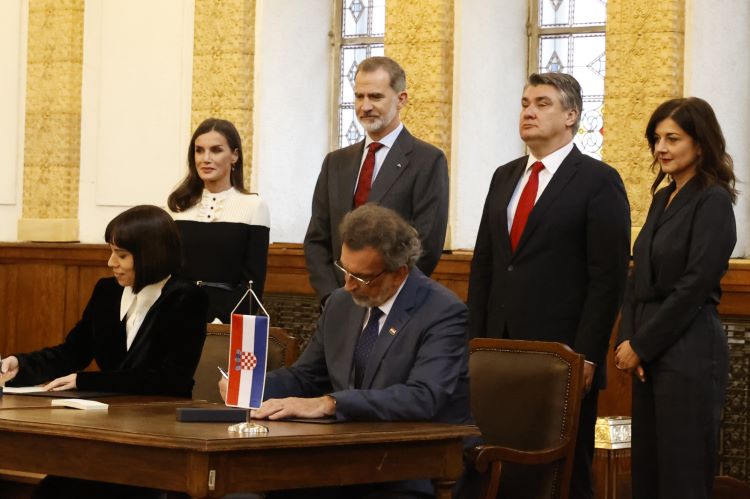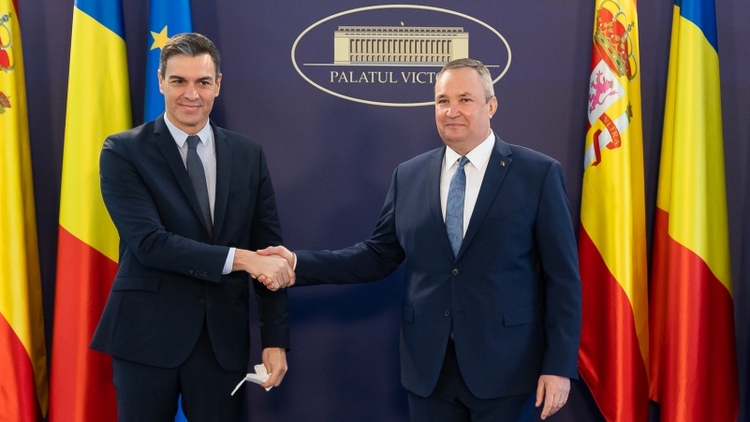The Diplomat
The King and Queen of Spain concluded yesterday their two-day official visit to Croatia by attending the signing of the Memorandum of Understanding for the joint construction of the European particle accelerator IFMIF-DONES (part of the European program to promote nuclear fusion as a source of energy) in the town of Escúzar, Granada.
On the first day of the visit, the King and Queen were received by the President of Croatia, Zoran Milanovic, and his wife, Sanja Music, and were entertained with a gala dinner, in whose toast Philip VI assured that relations between Croatia and Spain “have been growing closer in recent times” thanks to the “common membership” of NATO, the Council of Europe and the EU and the “common Mediterranean link” between the two countries.
The King and Queen of Spain began their day yesterday at the headquarters of the Croatian State Archives, where they inaugurated the Croatia-Spain IFMIF-DONES Forum, organized by the Ministry of Science and Education of the Croatian Government with the support of the Spanish Embassy in Zagreb, with the aim of making visible the IFMIF-DONES (International Fusion Materials Irradiation Facility-Demo Oriented NEu-tron Source) particle accelerator project, one of the most important milestones in the cooperation between Spain and Croatia.
During the forum, the Spanish Minister of Science and Innovation, Diana Morant, and the Croatian Minister of Science and Education, Radovan Fuchs, signed the Memorandum of Understanding between Spain and Croatia for the construction of the IFMIF-DONES particle accelerator in the province of Granada, a project that will require the participation of companies with a high technological profile. Among the participants in the Forum were, precisely, several Spanish companies and business associations.
“In 2017, Spain and Croatia joined their bids to host the IFMIF-DONES facility, agreeing on Granada as the ideal location,” said the King during a speech in English. “This facility will be a complementary project to ITER, and will focus on the identification, testing and validation of materials that can withstand extreme temperatures and can be used in the future construction of an electricity-producing fusion plant,” he continued. “This program is proof of the importance that both Croatia and Spain attach to research into viable energy sources for the future, and, on a bilateral level, it is a shining example of cooperation and partnership at its best between our two countries,” he added.
The IFMIF-DONES project consists of the construction of a neutron source to identify, test and certify materials capable of withstanding the extreme conditions to which the components of the first wall of the future DEMO fusion reactor will be exposed. The construction of IFMIF-DONES is on the roadmap of the European Union’s Fusion Program, aimed at demonstrating the viability of nuclear fusion as an energy source.
In 2016, Spain submitted a proposal to host this international facility in the municipality of Escúzar (Granada). In December 2017, after an international evaluation of the different candidatures submitted, and in parallel with the signing of an agreement between the Spanish and Croatian governments (which joined their candidacy to the Spanish one), the Governing Board of the European Agency in charge of managing the European fusion program (Fusion for Energy, also known as F4E) unanimously declared Granada to be the ideal European site for IFMIF-DONES.
Apart from that, and to strengthen the European character of IFMIF-DONES, Spain submitted in August 2017 the candidacy, with the endorsement of Croatia and the European Fusion Program, for the project in Granada to be included in the roadmap for strategic European infrastructures, created by the ESFRI forum (European Strategic Forum for Research Infrastructures). The proposal was accepted.
Spanish Collectivity and Prime Minister
After the forum, the King and Queen moved to the Residence of the Spanish Ambassador in Croatia, where they were received by the Ambassador, former Secretary of State for the EU Juan González-Barba, and held a meeting with the Spanish community residing in the country. The number of Spaniards registered in this Embassy as residents in Croatia is, according to November data, of 292 people, among which there are retired people living in Croatia, people working in NGOs such as REMAR or RETO, businessmen, international civil servants working in organizations such as UNICEF or the World Bank, the two readers of the Ministry of Foreign Affairs and the Spanish Agency for International Cooperation for Development (AECID) of Spanish in the universities of Zagreb and Zadar and descendants of mixed marriages who are fully integrated into Croatian society.
Late in the morning, the King went to the Croatian Parliament, where he held a meeting with the Speaker of the House, Gordan Jandrokovic, and later went to the Government Palace (Banski Dvor), where he met with the Prime Minister, Andrej Plenkovic. At the same time, the Queen visited the SUVAG Hearing and Speech Rehabilitation Clinic together with Sanja Music. These two activities concluded the King and Queen’s official visit to Zagreb.







